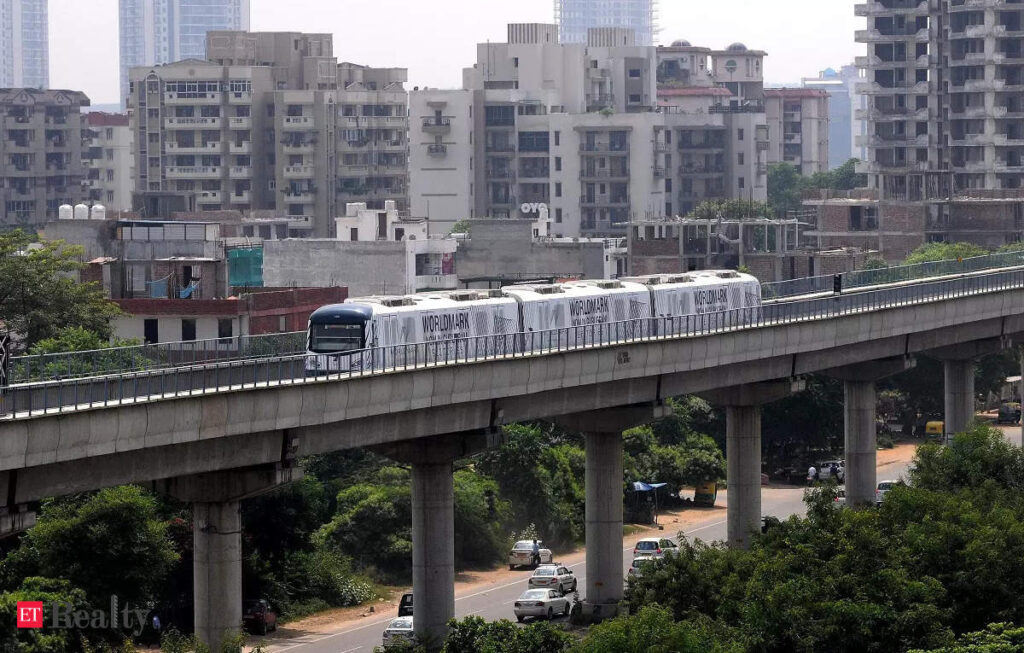GURUGRAM: The Transit Oriented Development (TOD) policy, which found mention in finance minister Nirmala Sitharaman’s Budget speech on Thursday, was implemented in Haryana in 2017, but has failed to make any significant impact on the urban landscape so far.
Areas within 800m of a mass rapid transport system (MRTS) are considered TOD zones in the state. As of now, such zones are along the metro tracks in Gurgaon and Faridabad. Over the next few years, they will also line the proposed rapid rail corridor that has been planned parallel to NH-8.
One of the primary intentions of the TOD policy is to encourage properties — both residential and commercial — along the transit routes so that people can walk to the stations and use public transport as much as possible.
To encourage properties to come up, the govt allows more FAR in these zones. For instance, areas within 500m of a transit corridor have an FAR of 3.5 while those within an 800m radius are allowed an FAR of 2.5. Since land use in these areas is mixed, properties can range from commercial, industrial and residential categories.
Sudhir Singh Chouhan, the chief town planner of Faridabad Metropolitan Development Authority (FMDA), said the land cost was more in areas that were nearer to the transit corridors. “For instance, if a transport line is considered the boundary wall, 800m on either side of it will be considered a TOD zone,” he added.
So, why is the TOD policy not having the desired impact? Experts said since adequate land was available in other parts of the city and its surroundings, developers might find it little feasible to invest in the TOD zones, where plot prices are higher.
Suman Kumar, a real estate consultant, wondered why people would invest in a house in a TOD zone when flats of the same size were way cheaper in other parts of the city. “There is no dearth of land in the city where housing projects are coming up,” he added. “A 3BHK flat will cost anything around Rs 3 crore off the Dwarka Expressway. But near a metro corridor, a flat the same size will come for many times this cost.”
In more than six years since the policy was implemented, only one leading developer on Golf Course Road has taken advantage of it.
Another reason is what experts dubbed the “retrofit” policy. Developers will find it attractive to invest around transit corridors only if there is ample progress in the projects. Gurgaon’s own metro corridor has been delayed for years. The government is now pinning its hopes on the rapid rail route, which will branch out of Sarai Kale Khan in Delhi and pass along NH8 and the airport.
Pradeep Mishra, another property dealer, said the policy was aligned with the development. “By the time it was implemented in 2017, the areas around metro corridor had already seen the development it had to. Since then, no new transit corridor has been announced. There are plans for the Gurgaon metro corridor. Rapid rail hasn’t hit the ground yet,” he added.
With the Centre now focusing on the policy, developers sounded optimistic.
Kushagra Ansal, the director of Ansal Housing, said the TOD policy could elevate the standards of urban living and foster economic prosperity. “Commercial and retail areas around transit corridors spark economic activity. So, properties in TOD zones frequently witness a rise in value because of the enhanced infrastructure, accessibility and overall attractiveness of the region,” he added.
Pradeep Aggarwal of Signature Global (India) Ltd said the TOD policy would boost the overall development of the region. “Apart from fostering sustainable urban growth, the proposed metro network connecting Old and New Gurgaon will also see a boost,” said Aggarwal.

